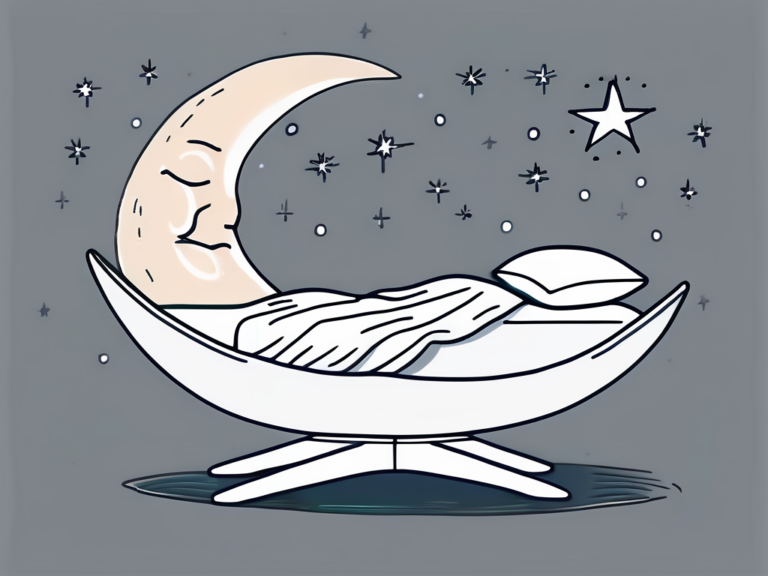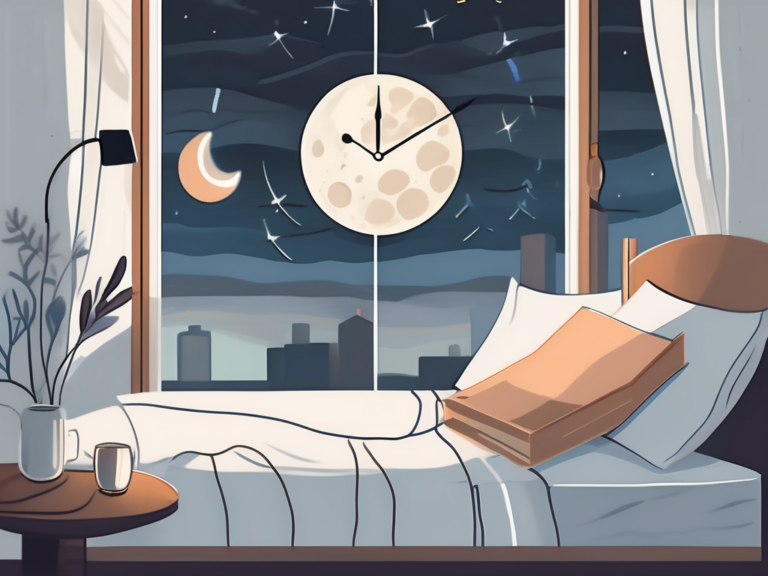Tips When You Can’t Sleep: Expert Advice for a Restful Night
Do you often find yourself tossing and turning in bed, unable to fall asleep? You’re not alone. Many people struggle with sleeplessness, and the impact it can have on our physical and mental well-being is significant. In this article, we will explore the importance of sleep, common causes of sleeplessness, expert advice for a restful night, the role of dietary habits and exercise in sleep quality, and when it may be necessary to seek professional help.
Understanding the Importance of Sleep
Sleep is not just a time of rest for our bodies; it is a crucial component of our overall well-being. Adequate sleep is essential for maintaining physical health and mental clarity.
The Role of Sleep in Physical Health
Sleep plays a vital role in our physical health. During sleep, our bodies repair and restore themselves, allowing us to wake up feeling refreshed and rejuvenated. But did you know that sleep also has a profound impact on our cardiovascular health?
Research has shown that insufficient sleep can increase the risk of developing heart disease and high blood pressure. When we don’t get enough sleep, our body’s stress response system goes into overdrive, causing an increase in blood pressure and inflammation. Over time, this chronic inflammation can lead to the development of cardiovascular problems.
Moreover, sleep is essential for regulating our bodily functions. It aids in maintaining a healthy weight, as it influences hormones responsible for appetite regulation. Insufficient sleep disrupts these hormones, increasing the risk of weight gain and obesity. But did you know that sleep deprivation can also affect our body’s ability to regulate blood sugar?
Studies have found that lack of sleep can impair insulin sensitivity, leading to an increased risk of developing type 2 diabetes. When we don’t get enough sleep, our body’s ability to process glucose effectively is compromised, resulting in higher blood sugar levels. This can have long-term implications for our overall health and well-being.
The Impact of Sleep on Mental Well-being
Not only does sleep affect our physical health, but it also has a significant impact on our mental well-being. Quality sleep helps improve our mood and mental clarity, allowing us to cope better with daily stressors and challenges. But did you know that sleep is also crucial for memory consolidation?
During sleep, our brain processes and consolidates information from the day, helping us retain and recall it more effectively. Research has shown that a good night’s sleep can enhance learning and improve memory retention. On the other hand, sleep deprivation can impair cognitive function, making it harder to concentrate, learn, and remember information.
Conversely, lack of sleep can contribute to the development or exacerbation of mental health conditions such as anxiety and depression. Sleep deprivation affects our emotional regulation, making it harder to manage emotions effectively. But did you know that sleep disturbances can also increase the risk of developing psychiatric disorders?
Studies have found that individuals with chronic sleep problems are more likely to experience symptoms of anxiety and depression. Disrupted sleep patterns can disrupt the delicate balance of neurotransmitters in the brain, leading to mood disorders. Addressing sleep issues can be a crucial step in improving mental health outcomes.
Common Causes of Sleeplessness
Understanding the underlying causes of sleeplessness can help us identify potential solutions. Two prevalent causes are stress and anxiety and medical conditions or sleep disorders.
Stress and Anxiety
Stress and anxiety can significantly disrupt our sleep patterns. Racing thoughts and worrying can make it difficult to unwind and fall asleep peacefully. It is essential to develop healthy coping mechanisms and relaxation techniques to manage stress and anxiety before bedtime.
One effective way to reduce stress and anxiety is through mindfulness meditation. By practicing mindfulness, we can train our minds to focus on the present moment, letting go of worries and concerns that may keep us awake at night. Deep breathing exercises can also be beneficial in calming the mind and promoting relaxation.
Medical Conditions and Sleep Disorders
Certain medical conditions and sleep disorders can interfere with the quality and duration of our sleep. Conditions such as sleep apnea, restless leg syndrome, and chronic pain can lead to frequent awakenings throughout the night. Identifying and treating underlying medical conditions is crucial for improving sleep quality.
If you suspect that a medical condition is causing your sleeplessness, it is important to consult with a healthcare professional. They can conduct a thorough evaluation and recommend appropriate treatments or interventions. In some cases, a sleep study may be necessary to diagnose and treat sleep disorders accurately.
Expert Advice for a Restful Night
Experts recommend implementing sleep hygiene practices and relaxation techniques to improve the likelihood of a restful night’s sleep.
Sleep Hygiene Practices
Sleep hygiene refers to maintaining a consistent and healthy sleep routine. This includes going to bed and waking up at the same time every day, creating a calming bedtime routine, and ensuring your sleep environment is dark, quiet, and comfortable. Avoiding stimulating activities before bed, such as using electronic devices, can also improve sleep quality.
Relaxation Techniques for Better Sleep
Various relaxation techniques can help calm the mind and prepare the body for sleep. These include deep breathing exercises, progressive muscle relaxation, guided meditation, and aromatherapy. Experiment with different techniques to find what works best for you.
Now, let’s delve deeper into the world of sleep hygiene practices. Establishing a consistent sleep schedule is crucial for regulating your body’s internal clock, also known as the circadian rhythm. By going to bed and waking up at the same time every day, you train your body to anticipate sleep and wakefulness, making it easier to fall asleep and wake up refreshed.
Creating a calming bedtime routine is another important aspect of sleep hygiene. Engaging in relaxing activities before bed, such as reading a book, taking a warm bath, or practicing gentle stretching exercises, can help signal to your body that it’s time to wind down and prepare for sleep. Avoiding stimulating activities, like watching intense movies or engaging in vigorous exercise, is equally important as they can interfere with your ability to relax and fall asleep.
Furthermore, optimizing your sleep environment can significantly impact the quality of your sleep. Ensure that your bedroom is dark, quiet, and cool. Consider using blackout curtains or an eye mask to block out any unwanted light, and use earplugs or a white noise machine to drown out any disruptive sounds. Investing in a comfortable mattress and pillows that support your body’s natural alignment can also contribute to a more restful night’s sleep.
Now, let’s explore the realm of relaxation techniques for better sleep. Deep breathing exercises, such as the 4-7-8 technique, can help activate the body’s relaxation response and promote a sense of calm. By inhaling deeply through your nose for a count of 4, holding your breath for a count of 7, and exhaling slowly through your mouth for a count of 8, you can release tension and prepare your body for sleep.
Progressive muscle relaxation involves systematically tensing and relaxing different muscle groups throughout your body. By consciously tensing each muscle group for a few seconds and then releasing the tension, you can promote physical and mental relaxation. This technique can be particularly helpful for individuals who experience muscle tension or restlessness before bed.
Guided meditation, whether through audio recordings or smartphone apps, can guide you into a state of deep relaxation and help quiet your mind. By focusing on your breath, visualizing peaceful scenes, or repeating calming affirmations, you can cultivate a sense of tranquility that facilitates sleep.
Aromatherapy, the use of essential oils, can also enhance your sleep experience. Lavender, chamomile, and bergamot are known for their calming properties and can be diffused, applied topically, or added to a warm bath to promote relaxation. Experiment with different scents to find the ones that resonate with you and help create a soothing sleep environment.
Dietary Habits and Sleep
What we eat and drink can significantly impact our ability to fall asleep and stay asleep throughout the night. Some foods promote sleep, while others can disrupt it.
When it comes to promoting sleep, there are certain foods that can work wonders. One such group of foods is those that are rich in tryptophan. Tryptophan is an amino acid that serves as a precursor to serotonin, a neurotransmitter that regulates sleep. So, if you’re looking to enhance your sleep quality, consider incorporating turkey, dairy products, and nuts into your diet. These foods are not only delicious but can also help you drift off into a peaceful slumber.
In addition to tryptophan-rich foods, there are other sleep-promoting options that you can explore. Tart cherries, for example, have been found to naturally increase melatonin levels in the body, which is a hormone that regulates sleep-wake cycles. So, next time you’re craving something sweet before bed, why not reach for a handful of these delightful cherries? Another fruit that can aid in promoting sleep is kiwi. Packed with antioxidants and serotonin, kiwi has been shown to improve sleep quality and duration. Lastly, incorporating whole grains into your evening meal can also have a positive impact on your sleep. Whole grains, such as brown rice and quinoa, are rich in magnesium, which is known to relax the muscles and promote a sense of calmness, making it easier for you to doze off into dreamland.
While there are foods that can help promote sleep, there are also beverages that should be avoided if you want to achieve a restful night’s sleep. Caffeinated beverages, such as coffee and energy drinks, should be consumed with caution, especially close to bedtime. The stimulating effects of caffeine can interfere with your ability to fall asleep and stay asleep. It’s best to limit your intake of these beverages, particularly in the evening, to ensure that your body has enough time to wind down before bedtime.
Another drink that should be avoided before bed is alcohol. While it may initially make you feel drowsy, alcohol disrupts the sleep cycle and can lead to fragmented sleep. It can interfere with the production of melatonin, making it harder for you to achieve deep, restorative sleep. So, if you’re aiming for a good night’s sleep, it’s advisable to limit your alcohol consumption, especially in the hours leading up to bedtime.
The Role of Exercise in Sleep Quality
Regular physical activity has numerous benefits for our overall health, including improved sleep quality. But have you ever wondered why exercise has such a positive impact on our sleep? Let’s dive deeper into the science behind it.
When we engage in physical activity, our body temperature rises, and our heart rate increases. This increase in body temperature triggers a natural cooling process, which helps promote sleep. Additionally, exercise stimulates the production of endorphins, also known as “feel-good” hormones, which can help reduce stress and anxiety, leading to a more restful night’s sleep.
Best Time to Exercise for Optimal Sleep
Engaging in moderate-intensity exercise earlier in the day is ideal for promoting better sleep. Exercising too close to bedtime can increase alertness and make it harder to fall asleep. It is recommended to allow at least a few hours between exercise and bedtime. This time gap allows your body temperature to return to normal, ensuring a smoother transition into sleep.
Furthermore, exercising in the morning or afternoon exposes you to natural light, which helps regulate your body’s internal clock. This synchronization with the natural light-dark cycle can improve your sleep-wake cycle, making it easier to fall asleep at night and wake up feeling refreshed in the morning.
Types of Exercise for Better Sleep
Any form of physical activity can improve sleep quality. Find an exercise routine that you enjoy, whether it’s walking, jogging, swimming, or practicing yoga. The key is to engage in activities that elevate your heart rate and get your body moving. Regular exercise can help reduce stress and anxiety, making it easier to fall asleep and stay asleep throughout the night.
It’s important to note that while exercise can enhance sleep quality, it’s essential to listen to your body and avoid overexertion. Pushing yourself too hard can lead to muscle soreness and discomfort, which may interfere with your sleep. Remember to start gradually and gradually increase the intensity and duration of your workouts to avoid any unnecessary strain on your body.
When to Seek Professional Help
If you consistently struggle with sleeplessness and have tried various strategies without success, it may be necessary to seek professional help.
Recognizing Chronic Insomnia
Chronic insomnia is diagnosed when difficulties with falling asleep or staying asleep persist for at least three nights a week for three months or longer. A sleep therapist or clinician can evaluate your symptoms, identify potential underlying causes, and recommend appropriate treatments.
The Role of Sleep Therapists and Clinics
Sleep therapists and clinics specialize in diagnosing and treating sleep disorders. They can provide personalized treatment plans tailored to your specific needs. These may include cognitive-behavioral therapy for insomnia (CBT-i) or medications, depending on the underlying cause of your sleeplessness.
When it comes to seeking professional help for chronic insomnia, it’s important to understand the role of sleep therapists and clinics in providing comprehensive care. These professionals are highly trained in the field of sleep medicine and have a deep understanding of the complex factors that contribute to sleep disorders.
During your initial consultation with a sleep therapist or clinician, they will conduct a thorough assessment of your sleep patterns and medical history. This evaluation helps them identify any underlying medical conditions or lifestyle factors that may be contributing to your sleeplessness. By taking a holistic approach to your sleep health, they can develop a personalized treatment plan that addresses the root causes of your insomnia.
One of the key treatment options offered by sleep therapists and clinics is cognitive-behavioral therapy for insomnia (CBT-i). This evidence-based therapy focuses on changing negative thoughts and behaviors that may be interfering with your ability to sleep. Through a combination of techniques such as relaxation training, sleep restriction, and stimulus control, CBT-i aims to improve your sleep quality and quantity without the use of medication.
In some cases, sleep therapists and clinicians may also recommend medication as part of your treatment plan. Medications for insomnia can help regulate your sleep-wake cycle and promote better sleep. However, it’s important to note that medication should be used under the guidance of a healthcare professional and only as a short-term solution, as long-term use can lead to dependency and other side effects.
Overall, seeking professional help for chronic insomnia is a proactive step towards improving your sleep and overall well-being. Sleep therapists and clinics offer specialized expertise and a range of treatment options to help you regain control of your sleep and achieve restful nights. Remember, quality sleep is essential for optimal physical and mental health, so don’t hesitate to reach out for professional support if you’re struggling with chronic insomnia.
Conclusion
Prioritizing sleep and establishing healthy sleep habits are essential for our overall well-being. By understanding the importance of sleep, addressing common causes of sleeplessness, implementing expert advice for a restful night, maintaining a balanced diet, and incorporating regular exercise into our routine, we can increase our chances of enjoying a restful night’s sleep. If sleep problems persist, seeking professional help can provide further insights and guidance towards achieving optimal sleep quality.






